
Tazal Ahmed, Sailor, Gram Ghutia, P.O. Shadar, Noakhali
On 24 November 2016, I went to Noakhali in eastern Bangladesh with sound recordist Ali Ahsan, searching for Tazal Ahmed, who had sung two songs for Arnold Bake on board the Streefkerk in 1934. Following the leads from the catalogue of the Berlin Phonogramm Archiv, I wondered if some family of Tazal Ahmed could still be found in his village Ghutia in Noakhali Shadar (usually written as Sadar, but Bake was probably writing as he listened; he was writing the sound)? The recording was more than 80 years old, so there was of course no chance of finding the singer. But perhaps someone with some connection would tell us something? Perhaps he had settled in London or somewhere else in the UK, as many sailors did? Perhaps someone would be able to say something about the song? So, the first stop would have to be Noakhali Sadar. Ali and I took a bus from Dhaka to Noakhali and went to the office of the District Magistrate. No one seemed to have heard of Ghutia, but some people talked about Sholla Ghutia. So that is where we went, but realised that it was a fairly new place, formed as a result of the rising of a new char or silt island. They talked about the River Bhulua, which had changed its course over the last forty years, washing away places which would have existed in the 1930s. Sadar now is not how Sadar was then. Could it then be that the river had washed away Tazal Ahmed’s Ghutia village?
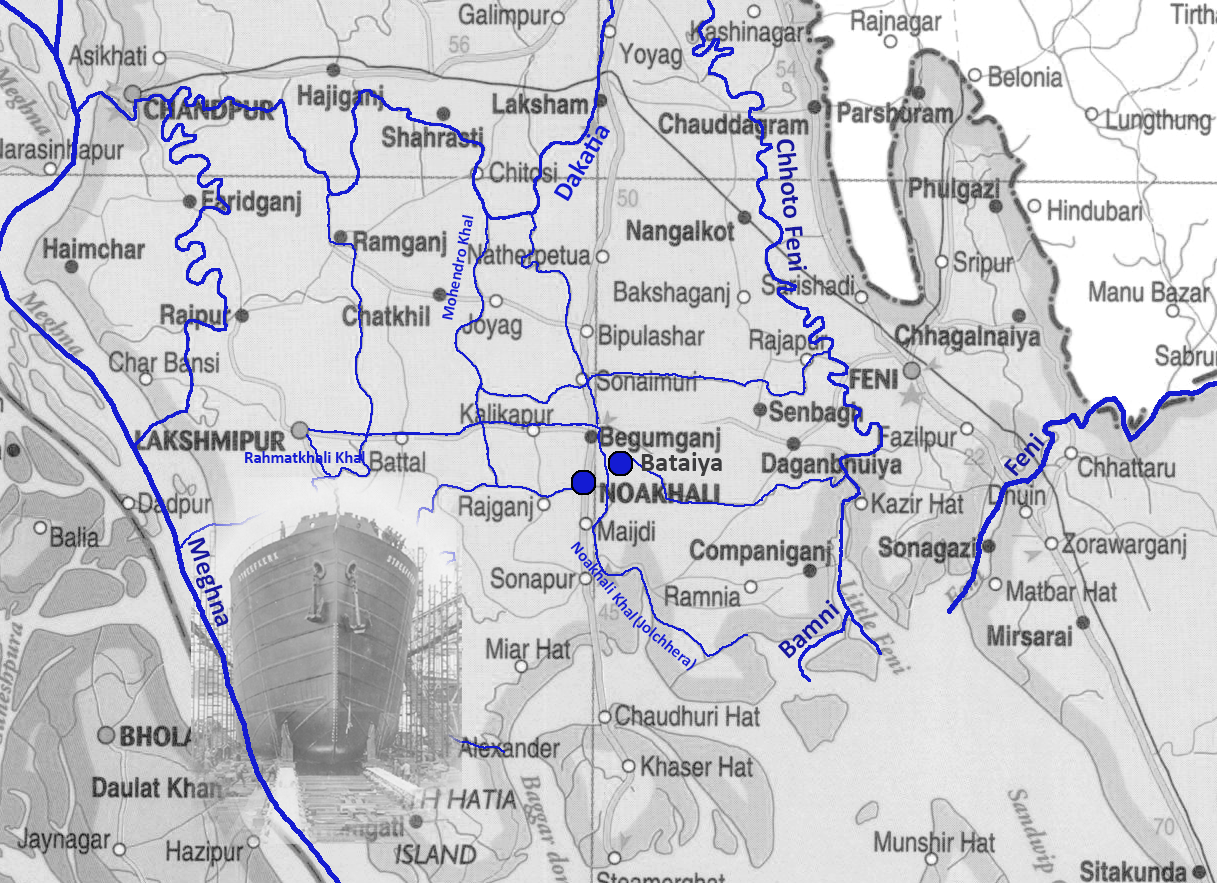
Map with image of the Streefkerk. Designed by Purba Rudra
The three-wheeler driver took us to a place when we told him we wanted to go to Sholla Ghutia. There we made random acquaintance of a man of about 50 years named Ali Ashraf Uddin and he said the name of his village was Purba Shullukiya and we were in Dharmapur Union; place-names were already getting mixed up. He had not heard of Ghutia, but he fetched an older man who could know something.
Caption: Ali Ashraf Uddin, my friend Ali Ahsan and I talk and I explain a few tings about my work. Then Ashraf Uddin sends someone to get an older man who might know something more. We talk about many things, rivers and chars and his children and his wish to go to Kolkata. There is one thing from this conversation which has stayed with me. I am looking through the archival notes for Bake’s sailors’ songs and I mutter names of the other places from where the seamen came. Hirpur Bazar in Comilla, Dhamrasari in Sylhet. ‘That would be in Uttar Banga [north Bengal],’ Ali Ashraf Uddin says. ‘Not Uttar Banga, it is Sylhet,’ I correct him. I think North Bengal is the Rangpur and Rajshahi region of Bangladesh, bordering Indian North Bengal. ‘Sylhet is our Uttar Banga,’ Ali Ashraf Uddin corrects me. This thing about how locations on a map are relative had not occurred to me before, and it was a lesson beautifully learned. At about 00:13:34 into our conversation above, the older man we were waiting for, Abdul Ali Bhuiyan, arrives.
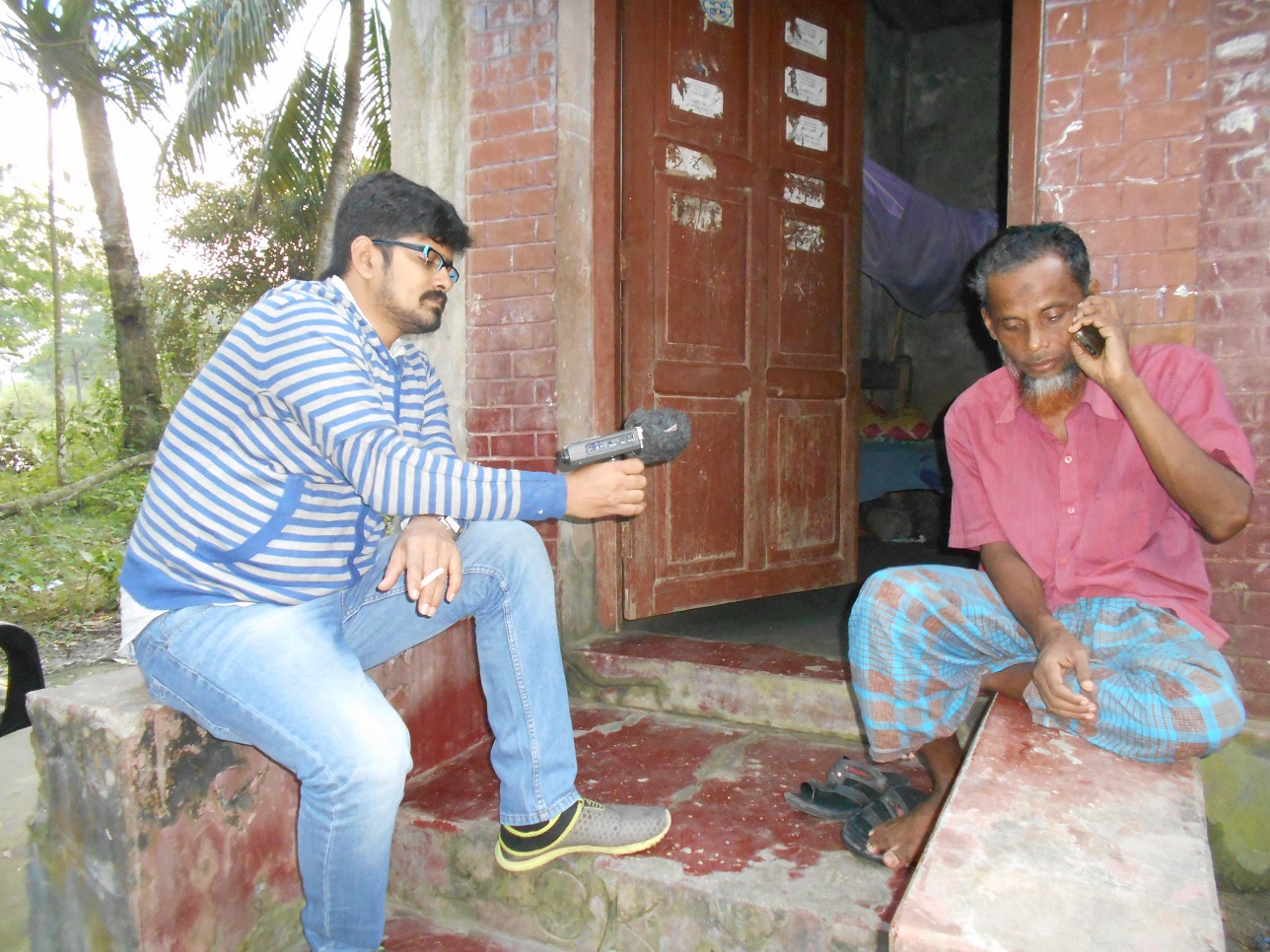
Caption: Ali Ahsan records Ali Ashraf Uddin on my Zoom HN4 recorder. 24 November 2016. Photo: Moushumi
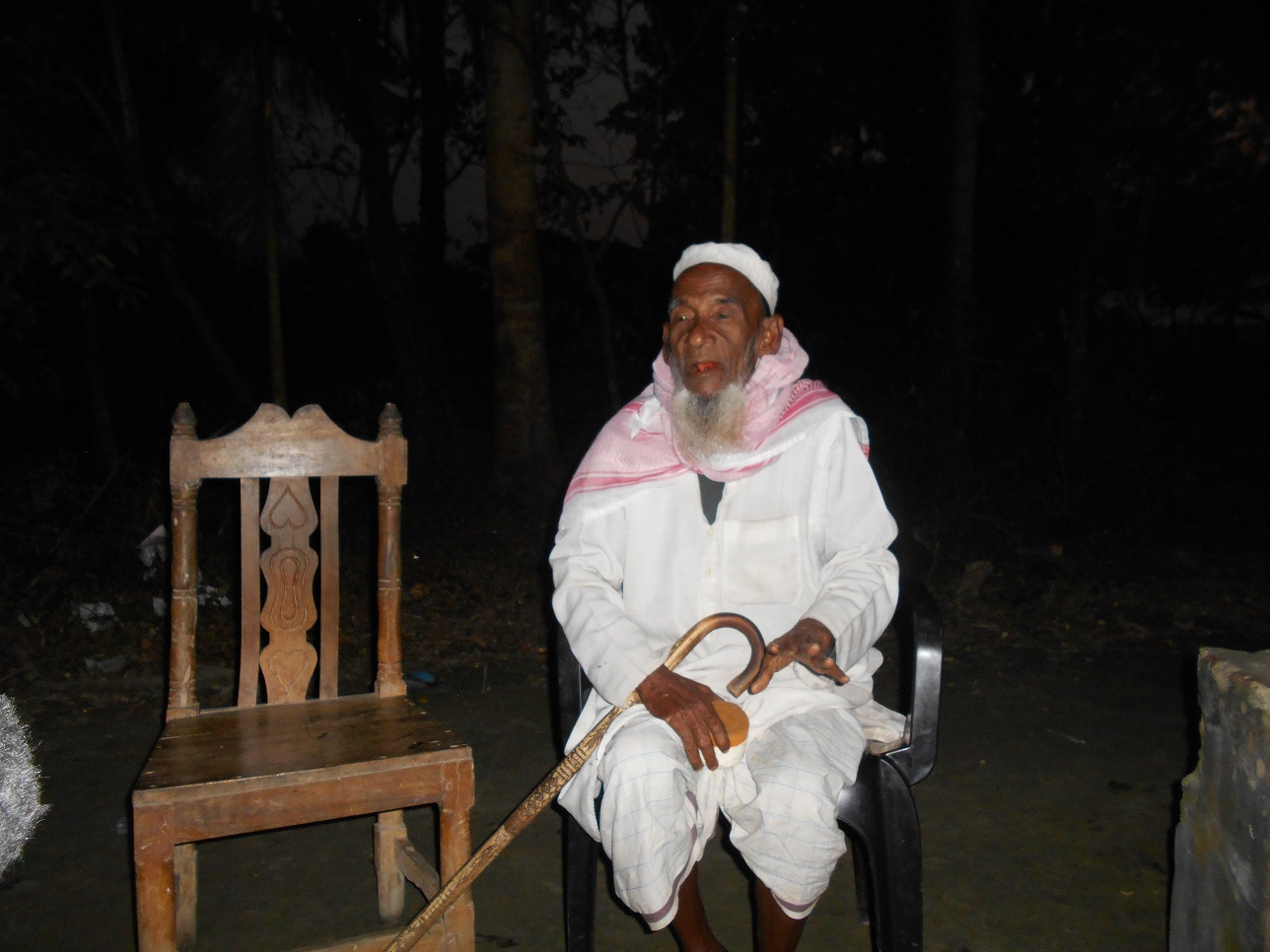
Caption: Abdul Ali Bhuiyan, 90, in Shullukia village, Dharampur Union, Noakhali. Photo: Moushumi
Caption: The conversation with Abdul Ali Bhuiyan continues. He is about 90 years old. He has seen rivers changing their course, battles for independence, floods and famines; he has seen countries break up and new countries rise like new silt islands.
Abdul Ail Bhuiyan did not know about Ghutia either. ‘Many Hindu names have changed after Partition,’ he said. ‘But, Ghutia is neither Hindu nor Muslim,’ I said. There was another possibility. Could it be that Bake had heard the name of the place wrong, or he had misspelt it? Perhaps the archivist had wrongly deciphered Bake’s handwriting? Ali Ashraf Uddin said there was an even older man who lived west of Maijdi, west of Rowshan Bani cinema, with whom we could take a chance. So, Ali Ahsan and I went to meet Dilmohor Talukdar. The whole journey had a charm of its own, although I had a sense we were walking through a maze. But once you are in it, you have to go through the whole trail. I did not take out my recorder, everything cannot be recorded with a machine.
Dilmohor Talukdar had an innocence which comes with age and it was just beautiful to be in his home. He was keen to go on this place-hunt with us. ‘We will go to the river with a picnic, light a fire, cook a duck …’ he began to dream. His family members joined in the game. People started to make phone calls to various people. Someone suggested we go to Bataiya, since there seemed to be no place called Ghutia, and since these were similar sounding names (if you think of ‘Ghut’ being pronounced not as ‘hoot’ but as ‘hut’). Perhaps it was Bataiya then, an older village, from where it seems that people went to work on ships? Could it be that someone who has worked on ships in the last 50 years would have heard the name of Tazal Ahmed?
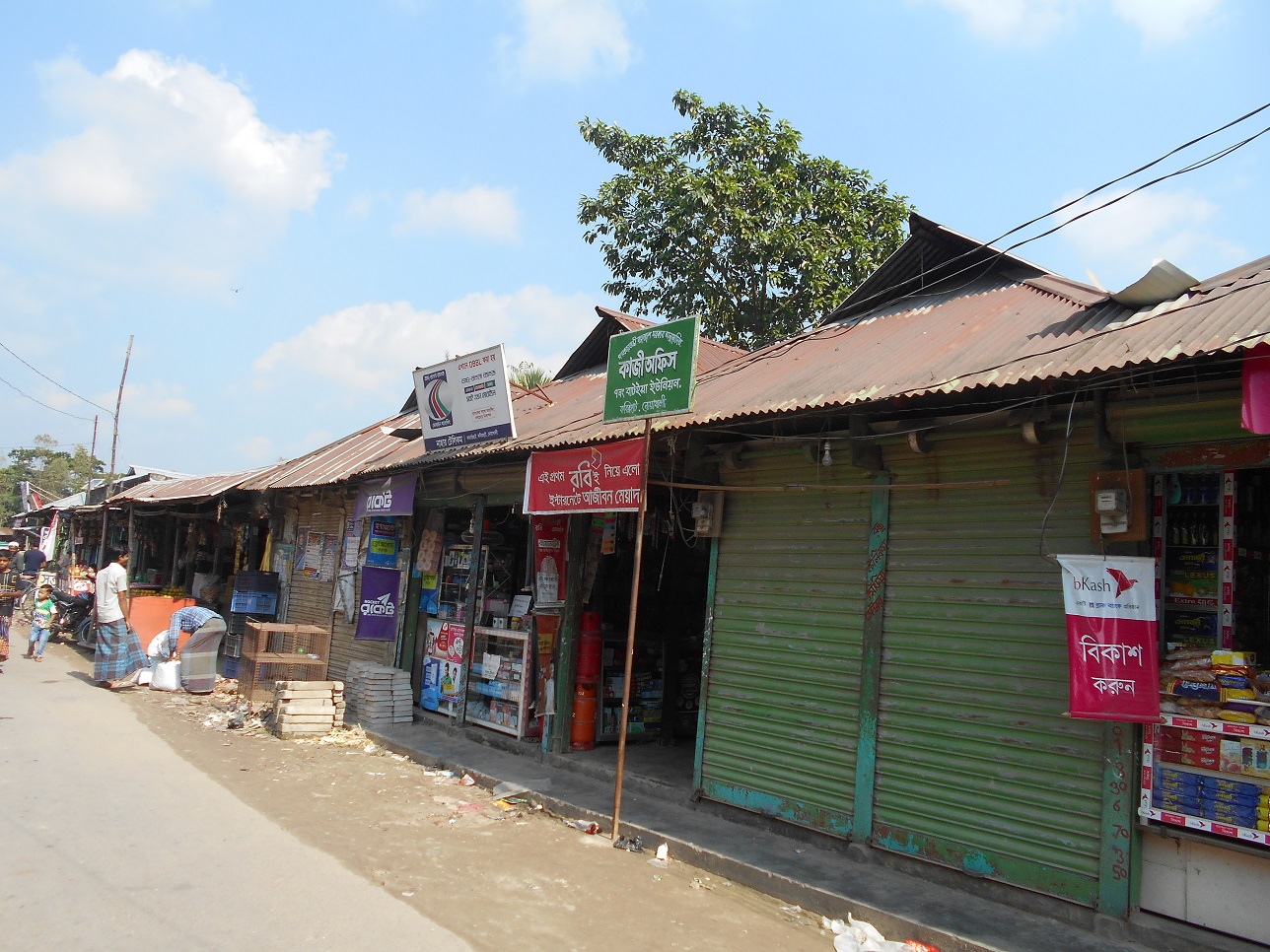
Bataiya, 25 November 2016. Photo: Moushumi
So, the next day we went to Bataiya, without Dilmohor Talukdar, though. That is all there is to this story. That is the closest we could get to Tazal Ahmed’s village. I found nothing which could conclusively tell me whether or not I was on the right trail. There was a seaman in Bataiya, someone who would be far younger than Bake’s Tazal Ahmed. He had his own stories from post-Partition days; about people from his region who went to work on ships, about names of vessels and ports and about the War of 1971.
Haji Muhammad Shamsul Huq had gone to Karachi from Chittagong in the 1950s, looking for work. But he was too young and they did not give him work. Later he became a seaman. He said there was no one left now to remember the olden times.
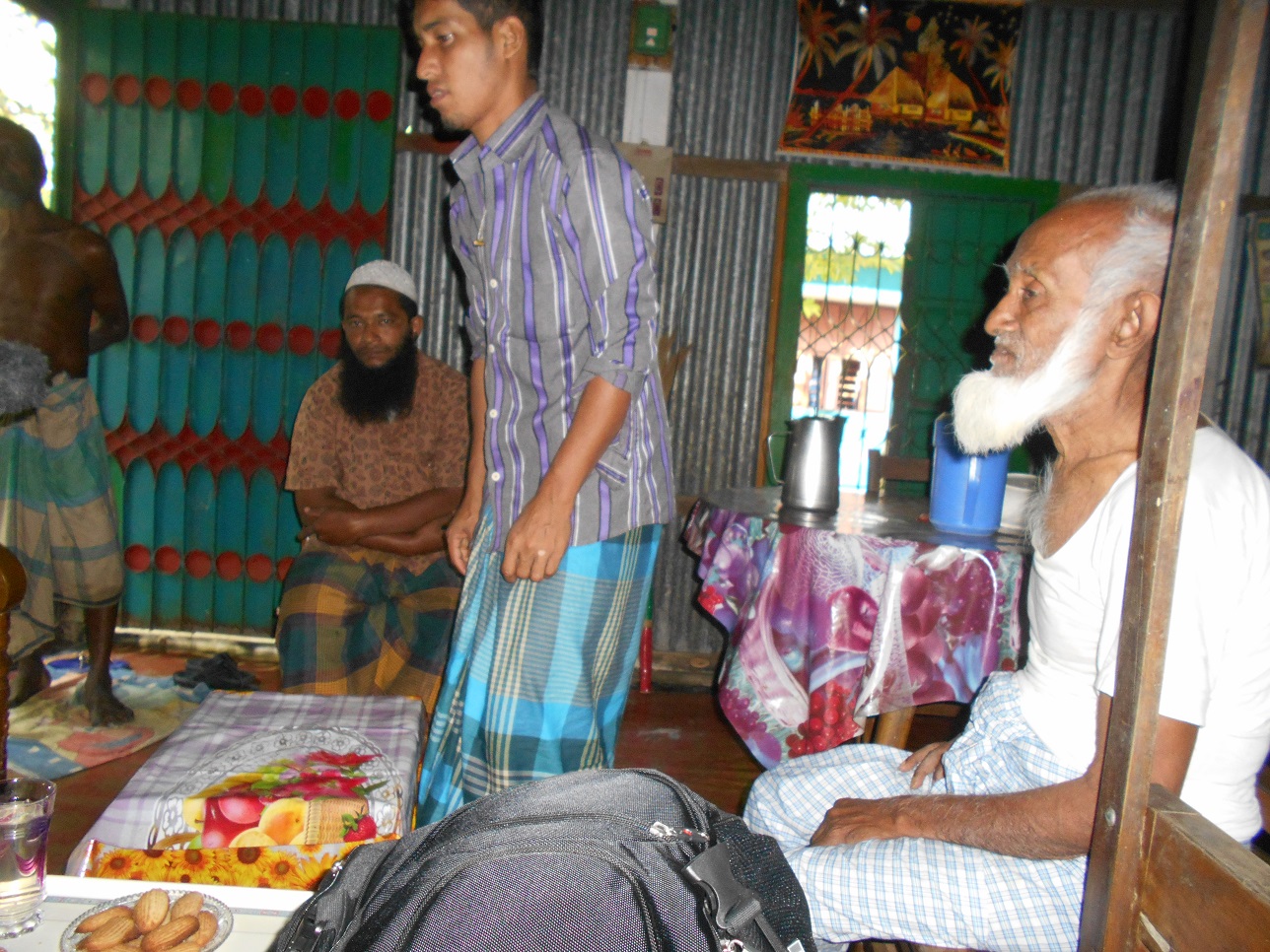
Haji Muhammad Shamsul Huq in his home in Bataiya. Photo: Moushumi
Noakhali’s old name was Bhulua. The official name of Noakhali was given in 1868. It comes from a noa- khal (new canal) built in mid-17th century, to protect the place from severe annual floods. The district is bordered by Comilla in the east and the Meghna estuary and Bay of Bengal in the south. Again, all of these places border one another also in Arnold Bake’s Bengal archives. Hirpur in Comilla was the home of our sailor Sayed Ali; oilman Sawabali and stoker Fayazullah came from Sylhet. I am yet to go to Comilla.
